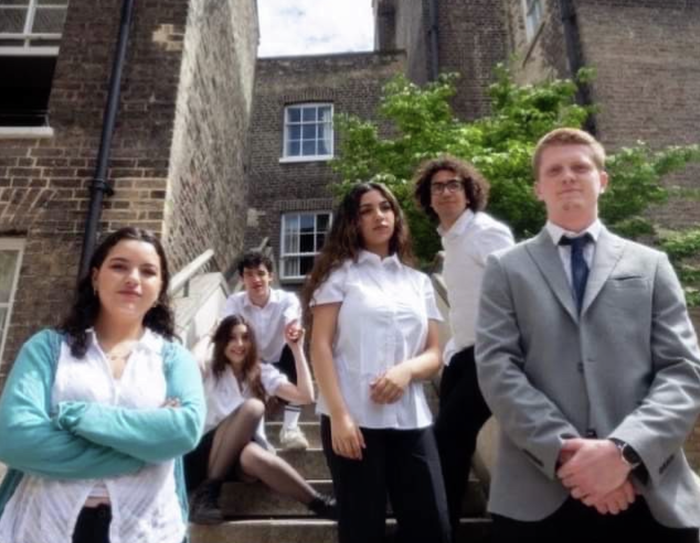Real Mad World review: original, daring and left the audience ruminating
Jack Ward’s ability to intertwine complex emotions and experiences with a captivating plot impresses at the Fringe

A tender, intimate, and powerful production, Real Mad World focuses on the relationship of Laura (played by Jack Ward) and Lindsay (played by Oscar Griffin). Laura is a transgender woman and a playwright. Her partner Lindsay is non-binary and works as a nurse. When Lindsay leaves the house for work, Laura stays inside to write, caught within a cycle of creativity and loss. The couple’s relationship is intensified by Lindsay’s insistence on trans revolutionary action, whilst Laura remains focused on her desire to carry and raise children, a yearning she recreates in her daily writing.
The show moves between scenes of quiet reassurance in the domestic space, towards energised enragement and care. Real Mad World expertly illustrates how anger and gentleness can both oppose and support one another. It reveals the complications of care and compassion in a relationship where creativity and imagination both aid and halt communication, but not in ways that can always be controlled or predicted.
The play’s overall ability to fuse playfulness and hurt is introduced in the very first scene
The set is simple, decorated with soft lighting, a copy of Jose Muñoz’s Queer Utopia, and the gradual singing of Laura Marling coming from a record player in the corner. The play begins with Laura sitting working, before being interrupted by her children playing and fighting around her. With this, the play’s overall ability to fuse playfulness and hurt is introduced in the very first scene. Whilst these imagined children are understood by the audience not to exist in reality, Ward’s play demonstrates how something being imagined does not make its loss or importance any less real.
The realness of this loss is revealed throughout the production, as we see Laura break down multiple times in moments of great vulnerability on stage. One of the most powerful moments in the play is when Laura tells Lindsay that they are lucky, as they have never had to mourn a child, revealing the grief Laura endures through her writing. Given the references to Laura Marling throughout the show, this reminded me of Marling’s lyric from Song for Our Daughter, that “you mourn in your childish loss”. In Ward’s ruminating and rupturing writing, we see a loss centred around children which in turn requires an intimate and creative recognition of what it means to mourn something imagined.
Lindsay recognises Laura’s devastation, whilst sometimes misunderstanding the exact care she requires. Lindsay’s role is skilfully performed by Oscar Griffin, who gently manoeuvres the complex balance between reassurance and concern. When Laura is denied support from a gender care clinic, Lindsay suggests that she use bitcoin to purchase the relevant hormones online. Laura is initially astounded by this suggestion; Ward performs an astonishment which addresses the diversity of the trans experience in accessing hormones and navigating the minefield of endocrinology appointments and NHS waiting times. Lindsay provides a radical love, insofar as they are simultaneously ready to comment on Laura’s class privilege—she is able to afford hormone alternatives sourced via the dark web. Nonetheless, the writing recognises that such options carry their own dangers, reflecting Laura’s vulnerability as a trans woman.
In drawing upon ideas of love, sex, and care, Real Mad World depicts similar themes to those addressed in Ward’s recent play 52 Monologues For Young Transsexuals. With her most recent production, Ward has been able to add an extra layer, offering a further angle to the conversations started in 52 Monologues. Both plays show genuine originality, involving daringly crafted movement and script which inevitably leave the audience with much to think about. Esteban Muñoz writes of queerness as something that we can feel, as “the warm illumination of a horizon imbued with potentiality”. Real Mad World captures this potentiality, whilst recognising the possible ruptures and barriers that may complicate and enrich queer love.
Real Mad World was performed at Edinburgh Fringe Festival between 18-27th August
 News / Eight Cambridge researchers awarded €17m in ERC research grants27 December 2025
News / Eight Cambridge researchers awarded €17m in ERC research grants27 December 2025 News / Clare Hall spent over £500k opposing busway 24 December 2025
News / Clare Hall spent over £500k opposing busway 24 December 2025 Comment / League tables do more harm than good26 December 2025
Comment / League tables do more harm than good26 December 2025 Comment / The ‘class’ of Cambridge24 December 2025
Comment / The ‘class’ of Cambridge24 December 2025 News / Caius mourns its tree-mendous loss23 December 2025
News / Caius mourns its tree-mendous loss23 December 2025









